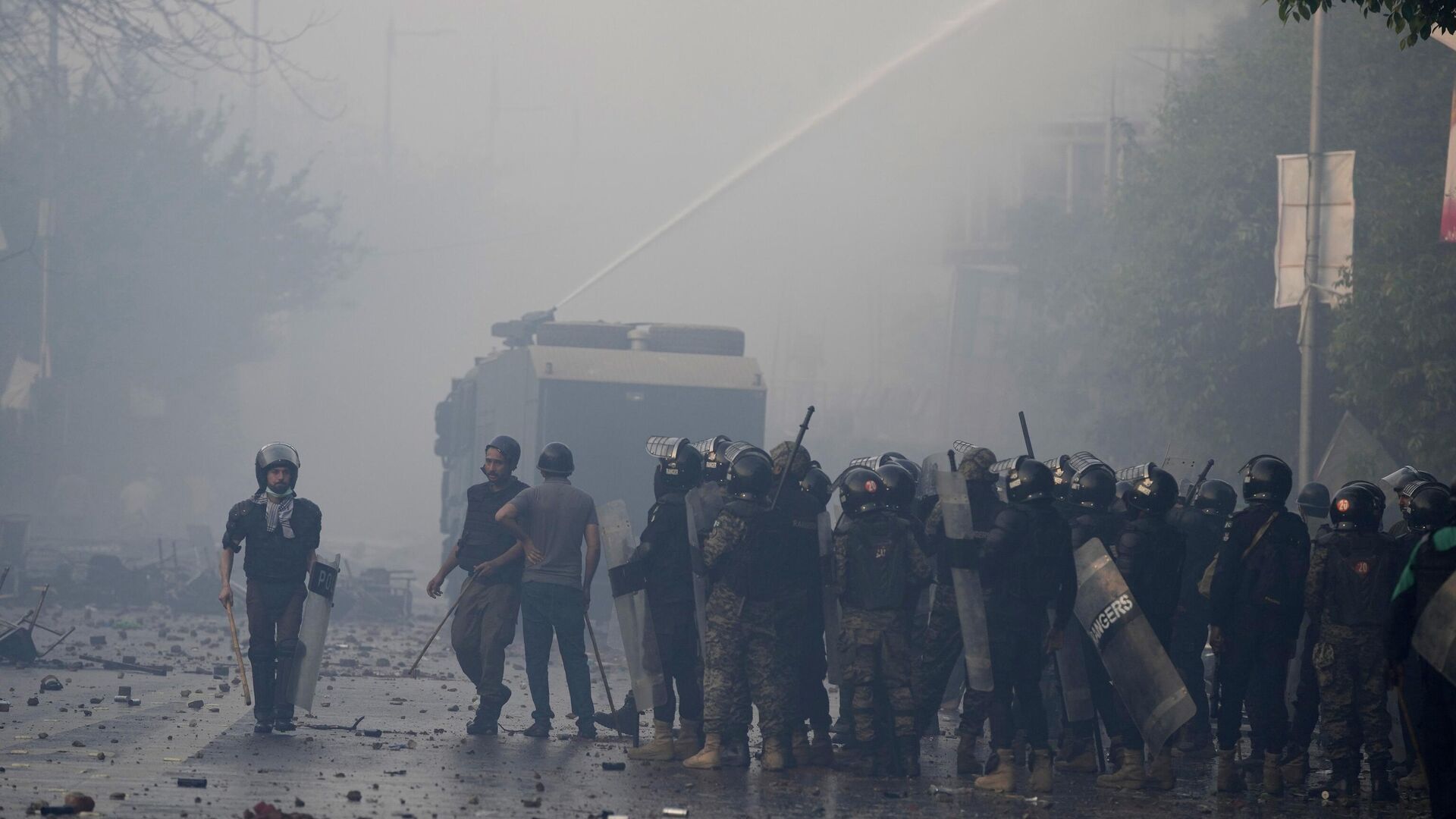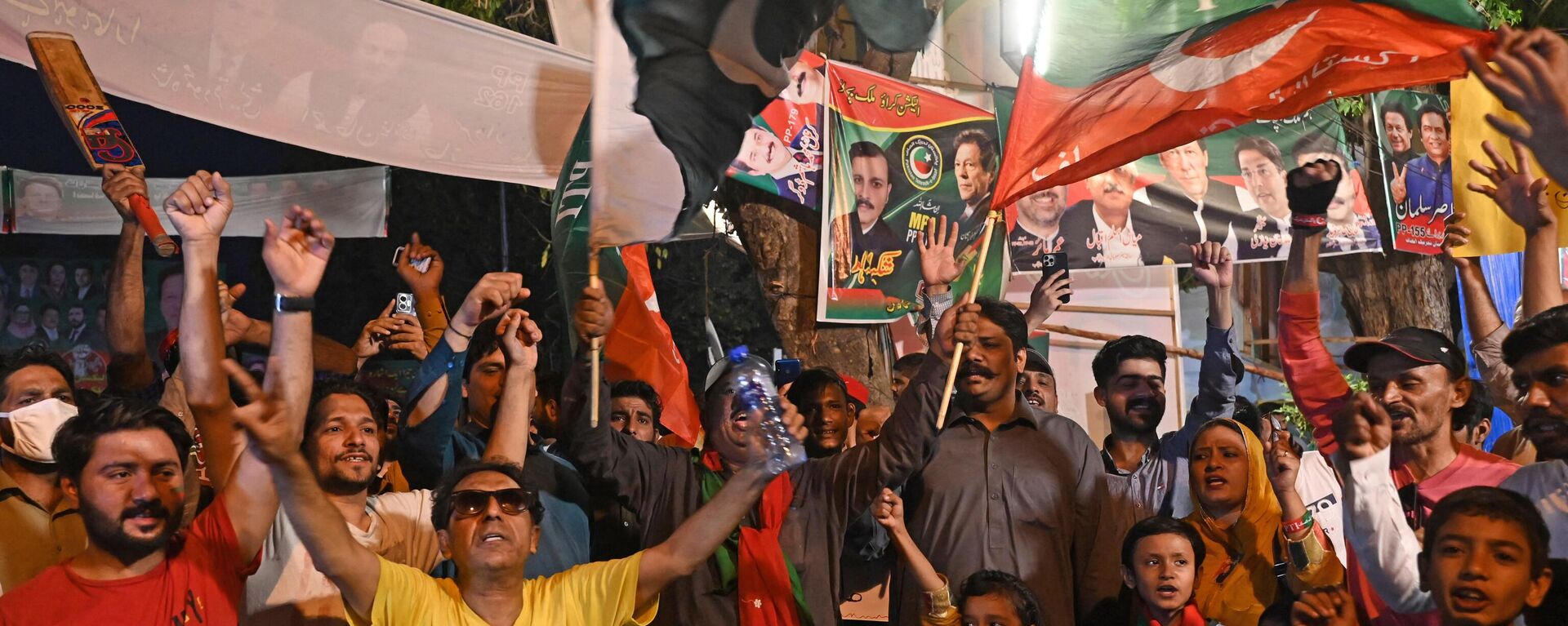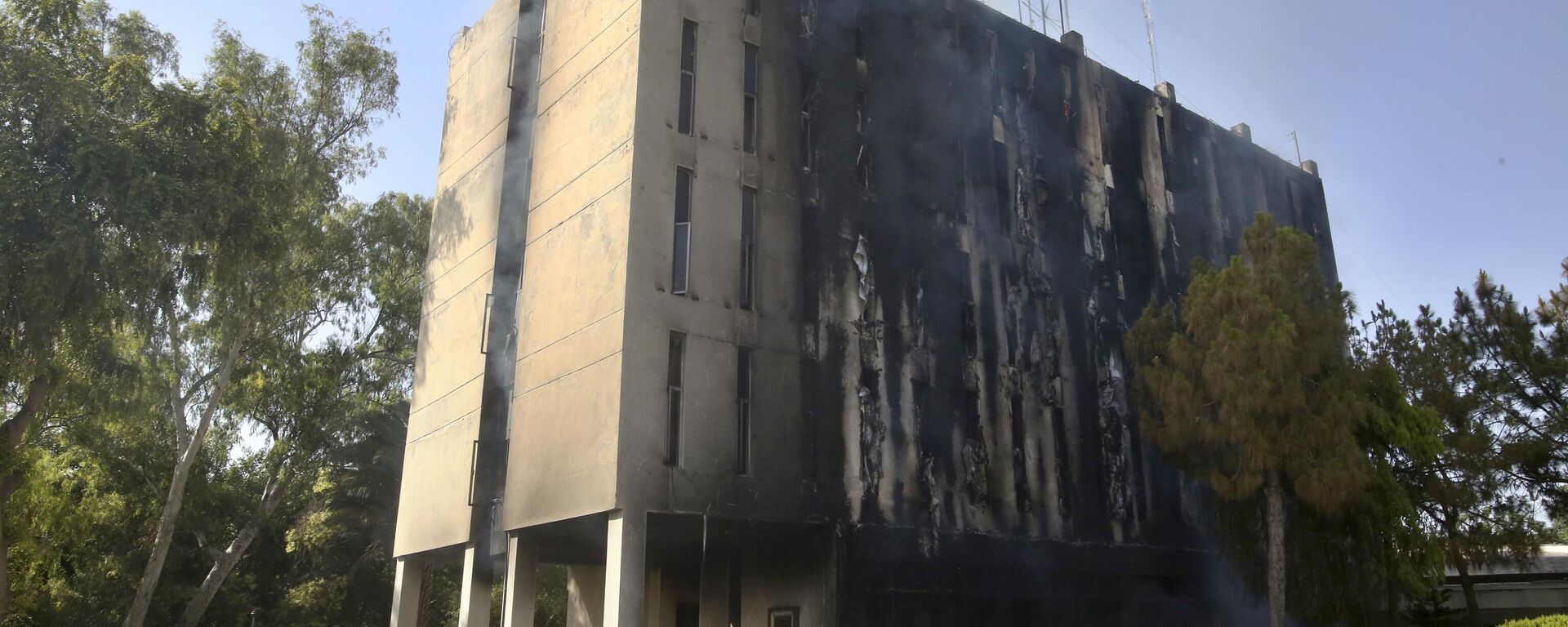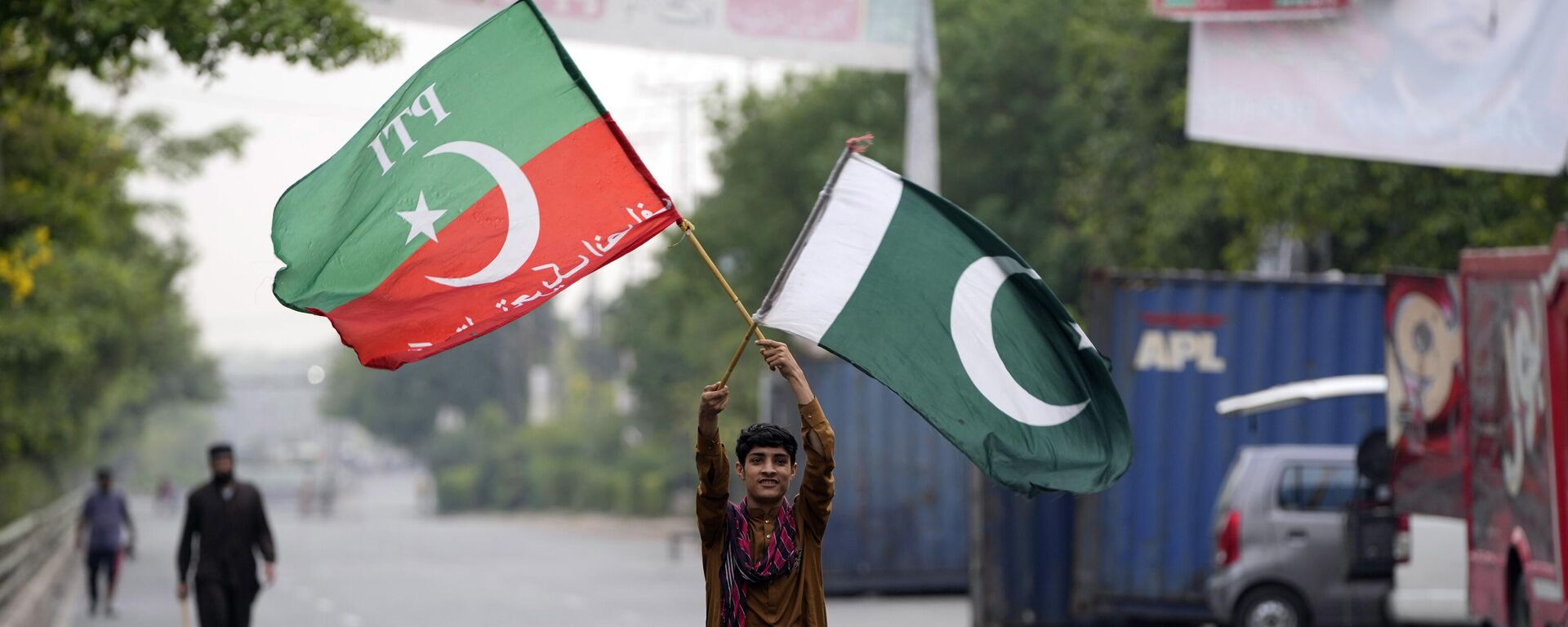https://sputniknews.in/20230525/empire-strikes-back-what-is-pakistans-army-act--can-it-be-used-against-protestors-2157071.html
Empire Strikes Back: What is Pakistan's Army Act & Can it Be Used Against Protestors?
Empire Strikes Back: What is Pakistan's Army Act & Can it Be Used Against Protestors?
Sputnik India
Pakistan’s army chief General Asim Munir has said that the legal process against people involved in violent protests on May 9 had been initiated under the Army... 25.05.2023, Sputnik India
2023-05-25T17:38+0530
2023-05-25T17:38+0530
2023-05-25T17:38+0530
pakistan
pakistan army
pakistan tehreek-e-insaf (pti)
imran khan
shehbaz sharif
political crisis
south asia
imran khan arrest
https://cdn1.img.sputniknews.in/img/07e7/03/0f/1167090_0:160:3073:1888_1920x0_80_0_0_075414e9541cf49b4aaa31b4cf3df5d7.jpg
Supporters of ex-Pakistan PM Imran Khan took to the streets across Pakistan, including in Lahore, Islamabad and Peshawar, to protest the arrest of Khan on May 9. The PTI chief was taken in a dramatic arrest by over 50 police rangers on corruption charges from a court in the capital, Islamabad.During Khan’s 48-hour detention, chaos erupted as many buildings, including army properties, such as the Corp Commander House in Lahore, were set on fire by angry mobs. The government of Shehbaz Sharif vowed to crush the protests, blaming Imran Khan’s PTI supporters for all the damage. The army was called up by the government in the capital, Islamabad, as well as the Punjab and Khyber Pakhtunkhwa provinces following the violent protests.In a recent speech, Prime Minister Shahbaz Sharif said that citizens who attack the civilian properties would be tried under the anti-terrorism laws, while those who attack the military installations would be tried "under the relevant laws in the constitution".Sharif did not clarify whether civilians would be tried under the Army Act, although the Army chief had previously said so. It could be because the PM knows that constitutionally the Army Act cannot be evoked to put civilians on trial without first bringing an amendment to Pakistan’s constitution, which requires a two-third majority win in the assembly.Sputnik takes a look at what powers exactly does the Army Act provide and whether it can be used against protesters during large-scale demonstrations.What is the Legal Issue with Pakistan’s Army Act on Civilians?It is no doubt that those responsible for damaging the public and private property across Pakistan must be brought to a fair trial and punished according to the law. However, putting civilians on trial in the military courts has a few setbacks.Pakistan's Army Act was established in 1952, in which military courts were to be used primarily to try members of the military only.Even after a military officer, a general or anyone involved in the army services retires, finishes his contract or is dismissed - he cannot be tried under the Army Act as it is only applicable to a serving officer.The act is meant to prosecute army personnel and only those civilians who are in some way directly working with the military. Furthermore, under the Army Act the military courts operate under a separate system from the civilian legal system and are run by military officers, where the judges are also military personnel and cases are tried at military installations, away from the public or the media eye. Hence, it is totally different from civilian courts and civilian legal systems.Since 1952 a few amendments have been made to the Army Act, especially during the three tenures of martial law in Pakistan. However, legally speaking even under those new amendments civilians cannot be put on trial under the Army Act without first bringing an amendment to the constitution of Pakistan.By the constitution of Pakistan and in most democratic societies only legal courts can legally put civilians to trial. In case anyone else wants to take upon themselves the duty of the courts, they need to first bring in the required amendment to the constitution.In 2014 after the APS school terror attack in Peshawar took place the nation was in deep grief as it mourned 144 deaths, mostly children. APS was an army school and majority of the children killed belonged to army families, so Tehrik-e-Taliban terrorists were tried in the military courts. But before those military trials took place, an amendment to the constitution was made - the 21st amendment to the constitution, which allowed the military courts to conduct trials on the civilian terrorists for two years only.Moreover, according to the constitution of Pakistan any political party that is registered with the Election Commission of Pakistan (Political Parties Order 2002) cannot be tried under the Army Act. PTI is a mainstream, registered political party with the Election Commission of Pakistan, hence its members cannot be put to trial in military courts, legally.Human Rights Watchdogs and Pakistanis ConcernedThe Human Rights Commission of Pakistan has opposed the use of the Army Act to try civilians.Barrister Ehtesham Amiruddin has said that if today the army wants to put all those people involved in violent protests on May 9 to military trials, it has to bring an amendment into the constitution through a two-thirds majority win in the senate first, otherwise it is illegal to do so.The barrister added that the destruction and damage that took place were definitely wrong and the perpetrators should be brought to justice but through fair and impartial trials. “There is plenty of evidence, so this evidence should be presented in courts and the judges can make the right decisions,” the barrister said.In this case, the fact that a civilian government of Shehbaz Sharif itself asked the army's help to maintain peace in Pakistan, allows the army to have extra powers so that they can enforce their version of law and order which may not be quite accurate from a democratic and legal point of view.Khan Denies Fighting the ArmyAmid all the political and legal pandemonium, PTI chief Imran Khan in a recent interview said that he is not against the Pakistan Army and never had the intention to fight with it.He also took to Twitter to voice his sympathies for the PTI colleagues who recently left his party.During the interview Khan also said that at present everything is being done just to dismantle Pakistan’s democracy. “Right now, as we speak, over 10,000 workers have been arrested. My entire senior leadership is in jail.”Khan and his party have tried to distance themselves from the incidents of May 9 and condemned vandalism in their recent statements. They had also said that PTI protestors were always peaceful previously and these riots were possibly infiltrated and staged to disgrace the party.However, the PDM government and the army believe the violent protests were "planned and organized," as they are adamant to put suspects on trial in military courts.
https://sputniknews.in/20230524/pakistan-may-ban-imran-khans-party-pti-defense-minister-khawaja-asif-2136958.html
https://sputniknews.in/20230516/pakistan-military-vows-to-try-arsonists-under-army-laws-1985733.html
https://sputniknews.in/20230518/imran-khan-accuses-govt-of-conspiring-to-trigger-rift-between-army-and-pti-2021800.html
pakistan
south asia
Sputnik India
feedback.hindi@sputniknews.com
+74956456601
MIA „Rossiya Segodnya“
2023
Aneela Rashid
https://cdn1.img.sputniknews.in/img/07e6/0c/0d/74548_0:0:485:484_100x100_80_0_0_821526e967ae85d041e2d30ee34fa1de.jpg
Aneela Rashid
https://cdn1.img.sputniknews.in/img/07e6/0c/0d/74548_0:0:485:484_100x100_80_0_0_821526e967ae85d041e2d30ee34fa1de.jpg
News
en_IN
Sputnik India
feedback.hindi@sputniknews.com
+74956456601
MIA „Rossiya Segodnya“
Sputnik India
feedback.hindi@sputniknews.com
+74956456601
MIA „Rossiya Segodnya“
Aneela Rashid
https://cdn1.img.sputniknews.in/img/07e6/0c/0d/74548_0:0:485:484_100x100_80_0_0_821526e967ae85d041e2d30ee34fa1de.jpg
pakistan, pakistan army, pakistan tehreek-e-insaf (pti), imran khan, shehbaz sharif, political crisis, south asia, imran khan arrest
pakistan, pakistan army, pakistan tehreek-e-insaf (pti), imran khan, shehbaz sharif, political crisis, south asia, imran khan arrest
Empire Strikes Back: What is Pakistan's Army Act & Can it Be Used Against Protestors?
Pakistan’s army chief General Asim Munir has said that the legal process against people involved in violent protests on May 9 had been initiated under the Army Act and Official Secrets Act.
Supporters of ex-Pakistan PM Imran Khan took to the streets across Pakistan, including in Lahore, Islamabad and Peshawar, to protest the arrest of Khan on May 9. The PTI chief was taken in a dramatic arrest by over 50 police rangers on corruption charges from a court in the capital, Islamabad.
During
Khan’s 48-hour detention, chaos erupted as many buildings, including army properties, such as the Corp Commander House in Lahore, were set on fire by angry mobs. The government of Shehbaz Sharif vowed to crush the protests, blaming Imran Khan’s PTI supporters for all the damage. The army was called up by the government in the capital, Islamabad, as well as the Punjab and Khyber Pakhtunkhwa provinces following the violent protests.
In a recent speech, Prime Minister Shahbaz Sharif said that citizens who attack the civilian properties would be tried under the anti-terrorism laws, while those who attack the military installations would be tried "under the relevant laws in the constitution".
Sharif did not clarify whether civilians would be tried under the Army Act, although the Army chief had previously said so. It could be because the PM knows that constitutionally the Army Act cannot be evoked to put civilians on trial without first bringing an amendment to Pakistan’s constitution, which requires a two-third majority win in the assembly.
Sputnik takes a look at what powers exactly does the Army Act provide and whether it can be used against protesters during large-scale demonstrations.
What is the Legal Issue with Pakistan’s Army Act on Civilians?
It is no doubt that those responsible for damaging the public and private property across Pakistan must be brought to a fair trial and punished according to the law. However, putting civilians on trial in the military courts has a few setbacks.
Pakistan's Army Act was established in 1952, in which military courts were to be used primarily to try members of the military only.
Even after a military officer, a general or anyone involved in the army services retires, finishes his contract or is dismissed - he cannot be tried under the Army Act as it is only applicable to a serving officer.
The act is meant to prosecute army personnel and only those civilians who are in some way directly working with the military. Furthermore, under the Army Act the military courts operate under a separate system from the civilian legal system and are run by military officers, where the judges are also military personnel and cases are tried at military installations, away from the public or the media eye. Hence, it is totally different from civilian courts and civilian legal systems.
Since 1952 a few amendments have been made to the Army Act, especially during the three tenures of martial law in Pakistan. However, legally speaking even under those new amendments civilians cannot be put on trial under the Army Act without first bringing an amendment to the constitution of Pakistan.
By the constitution of Pakistan and in most democratic societies only legal courts can legally put civilians to trial. In case anyone else wants to take upon themselves the duty of the courts, they need to first bring in the required amendment to the constitution.
In 2014 after the APS school terror attack in Peshawar took place the nation was in deep grief as it mourned 144 deaths, mostly children. APS was an army school and majority of the children killed belonged to army families, so Tehrik-e-Taliban terrorists were tried in the military courts. But before those military trials took place, an amendment to the constitution was made - the 21st amendment to the constitution, which allowed the military courts to conduct trials on the civilian terrorists for two years only.
Moreover, according to the constitution of Pakistan any political party that is registered with the Election Commission of Pakistan (Political Parties Order 2002) cannot be tried under the Army Act. PTI is a mainstream, registered political party with the Election Commission of Pakistan, hence its members cannot be put to trial in military courts, legally.
Human Rights Watchdogs and Pakistanis Concerned
The Human Rights Commission of Pakistan has opposed the use of the Army Act to try civilians.
"While those responsible for arson and damaging public and private property during the recent protests should be held to account, they remain entitled to due process," the group said.
Barrister Ehtesham Amiruddin has said that if today the army wants to put all those people involved in violent protests on May 9 to military trials, it has to bring an amendment into the constitution through a two-thirds majority win in the senate first, otherwise it is illegal to do so.
“Personally I feel that the army is very angry and upset because of what has happened, but such crucial decisions cannot be taken in a state of anger. Decisions need to be taken based on the law, constitution and legal standing. Currently there are so many people coming on TV and talking about the Army Act which is factually totally wrong and far from the constitutional and legal reality,” the barrister said.
The barrister added that the destruction and damage that took place were definitely wrong and the perpetrators should be brought to justice but through fair and impartial trials. “There is plenty of evidence, so this evidence should be presented in courts and the judges can make the right decisions,” the barrister said.
A political observer based in Islamabad told Sputnik that it is “never a good thing for a military court to operate in civilian society.”
In this case, the fact that a civilian government of Shehbaz Sharif itself asked the army's help to maintain peace in Pakistan, allows the army to have extra powers so that they can enforce their version of law and order which may not be quite accurate from a democratic and legal point of view.
Khan Denies Fighting the Army
Amid all the political and legal pandemonium, PTI chief Imran Khan in a recent interview said that he is not against the Pakistan Army and never had the intention to fight with it.
"Who fights his own army? If anyone fights [their] army, the country will come out to be the lone loser,” he said. “My fight is not with them [army]. They are angry with me, and I still don’t know why," Khan had said.
He also took to Twitter to voice his sympathies for the PTI colleagues who recently left his party.
"My sympathies go to all those who have been made to leave the party. And I commend and salute all the senior members who are resisting the extreme pressure to quit the party," he posted.
During the interview Khan also said that at present everything is being done just to dismantle Pakistan’s democracy. “Right now, as we speak, over 10,000 workers have been arrested. My entire senior leadership is in jail.”
Khan and his party have tried to distance themselves from the incidents of May 9 and condemned vandalism in their recent statements. They had also said that PTI protestors were always peaceful previously and these riots were possibly infiltrated and staged to disgrace the party.
However, the PDM government and the army believe the violent protests were "planned and organized," as they are adamant to put suspects on trial in military courts.





